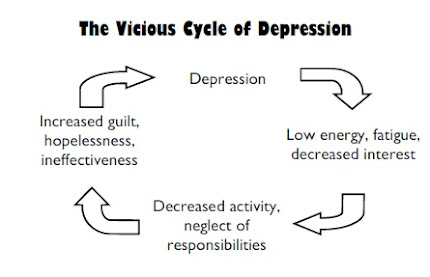The Cycle Of: Depression
This will be the start of a new series I'm calling The Cycle Of
In this series, I'll be discussing how our thoughts, actions and behaviours can perpetuate our current circumstances and mood. These powerful feedback loops are often hidden from our awareness, thus making them challenging to recognize or change. It is my hope that this series will help you recognize if you are inadvertently engaging in one of these vicious cycles - and what to do about it.
For today, I'll be discussing the cycle of depression.
We may step into this cycle for a variety of reasons, ranging from significant life stressors to a physiological cause. Whatever the case, depression typically presents as low energy, a loss of interest in previousy enjoyed activities and negative beliefs about self or the world.
When someone experiences these depressive symptoms, they may skip or neglect previously enjoyable experiences and engage in fewer productive activities. As a result, by the end of the day the person may feel ineffective, guilty and hopeless for how their day went, thus developing negative beliefs about themselves and their abilities. Unfortunately, these negative beliefs, coupled with the lack of engagement in enjoyable and productive activities, worsens the depression and leads to even less energy or interest in engaging with the world. This is where the cycle starts again and a person's depression is perpetuated further.
(The above diagram was created by the Centre for Clinical Interventions )
As you can see, each component of depression perpetuates this larger cycle. So what can be done?
Well the good news is, in the same way a cycle can be perpetuated with particular thoughts and actions, it can be reversed with new thoughts and actions!
By slowly building up enjoyable and productive activities, one can help to reverse this cycle. This behavioural change is known as Behavioural Activation (CBT approach). If you're not sure where to start, a great activity to incorporate into your day is some exercise.
Another action one can take is to seek medical support and consider medication. In appropriate circumstances, the right medication can be a wonderful way to help you regain some energy, reduce low mood and thus increase the odds you can follow through with Behavioural Activation and effectively step out of this cycle.
One can also work to build different thought habits that perpetuate a more realistic (and positive) perspective, which can also help to break this cycle. You can do this by gaining awareness of your thinking patterns, engaging in helpful self-talk and using strategies such as Cognitive Restructuring (CBT approach) or Cognitive Defusion (ACT approach) to interact with your thoughts in new ways.
For more information, a wonderful infograph on the cycle of depression and how to reverse it can be found here (created by the Centre for Clinical Interventions).
If you found this information useful and feel ready to step outside of this cycle, please consider reaching out to a mental health professional. They can assist you in reversing this cycle in a measured and manageable way and offer valuable insights and support.
